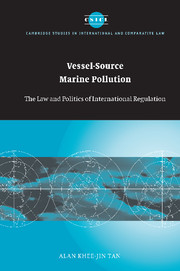Book contents
- Frontmatter
- Contents
- Foreword
- Preface
- Table of Conventions
- Table of European Union Instruments
- Table of IMO Resolutions and Guidelines
- Table of Miscellaneous Instruments
- Table of Domestic Legislation
- Table of Cases (International Courts and Tribunals)
- Abbreviations
- Part A The Regulation of Vessel-Source Pollution in its Eco-Political Context
- Part B Vessel-Source Pollution and the International Legislative Process
- 3 Vessel-Source Pollution and Regime Formation
- 4 Jurisdiction over Vessel-Source Marine Pollution
- 5 Implementation and Compliance
- 6 Liability and Compensation
- Part C The Future of Regulation
- Bibliography
- Index
- CAMBRIDGE STUDIES IN INTERNATIONAL AND COMPARATIVE LAW
4 - Jurisdiction over Vessel-Source Marine Pollution
Published online by Cambridge University Press: 24 July 2009
- Frontmatter
- Contents
- Foreword
- Preface
- Table of Conventions
- Table of European Union Instruments
- Table of IMO Resolutions and Guidelines
- Table of Miscellaneous Instruments
- Table of Domestic Legislation
- Table of Cases (International Courts and Tribunals)
- Abbreviations
- Part A The Regulation of Vessel-Source Pollution in its Eco-Political Context
- Part B Vessel-Source Pollution and the International Legislative Process
- 3 Vessel-Source Pollution and Regime Formation
- 4 Jurisdiction over Vessel-Source Marine Pollution
- 5 Implementation and Compliance
- 6 Liability and Compensation
- Part C The Future of Regulation
- Bibliography
- Index
- CAMBRIDGE STUDIES IN INTERNATIONAL AND COMPARATIVE LAW
Summary
The Concept of ‘Jurisdiction’ in Marine Pollution
The previous chapter has dealt with the substantive rule-making process in relation to vessel-source pollution and how this is influenced by the relevant actors' interests. A related issue is how international regulation shapes the jurisdiction of states to prescribe the substantive rules and to bring them to bear upon relevant target actors. Having examined the substantive content of the international rules and standards, it is imperative to appreciate how the jurisdiction to prescribe and enforce these rules is allocated among the different state actors.
The notion of state ‘jurisdiction’ over a particular event, its effects and/or its perpetrator(s) is one of the central tenets of international law. In the context of marine pollution regulation, ‘jurisdiction’ refers to the competence of states to prescribe and enforce legislation against vessels engaged in pollution. Thus, ‘prescriptive’ or ‘legislative’ jurisdiction relates to the state's competence to enact or promulgate substantive pollution control standards. These standards are often internationally agreed upon (e.g. at IMO as discussed in the previous chapter), even though international law may also endorse the prescription of national standards under certain circumstances.
The jurisdiction to prevent or punish the actual violation of the relevant standards would be termed ‘enforcement jurisdiction’, while ‘adjudicative jurisdiction’ is the power of national courts or tribunals to adjudicate prosecutions against a vessel or a person for transgressions of prescribed standards.
- Type
- Chapter
- Information
- Vessel-Source Marine PollutionThe Law and Politics of International Regulation, pp. 176 - 229Publisher: Cambridge University PressPrint publication year: 2005



